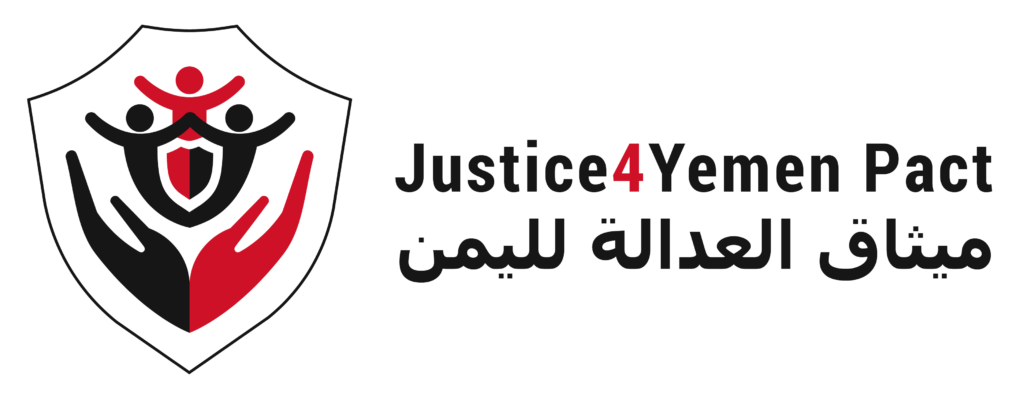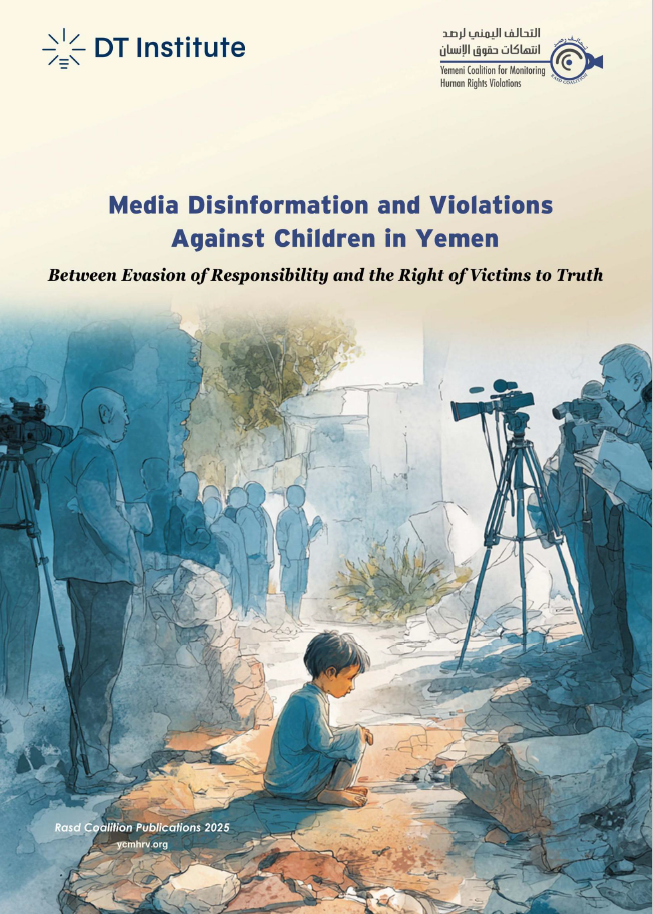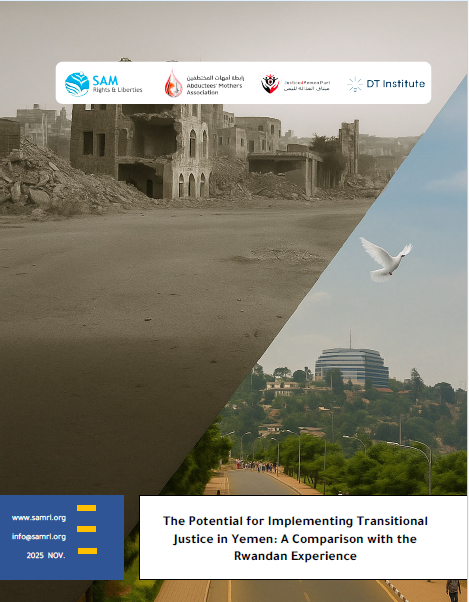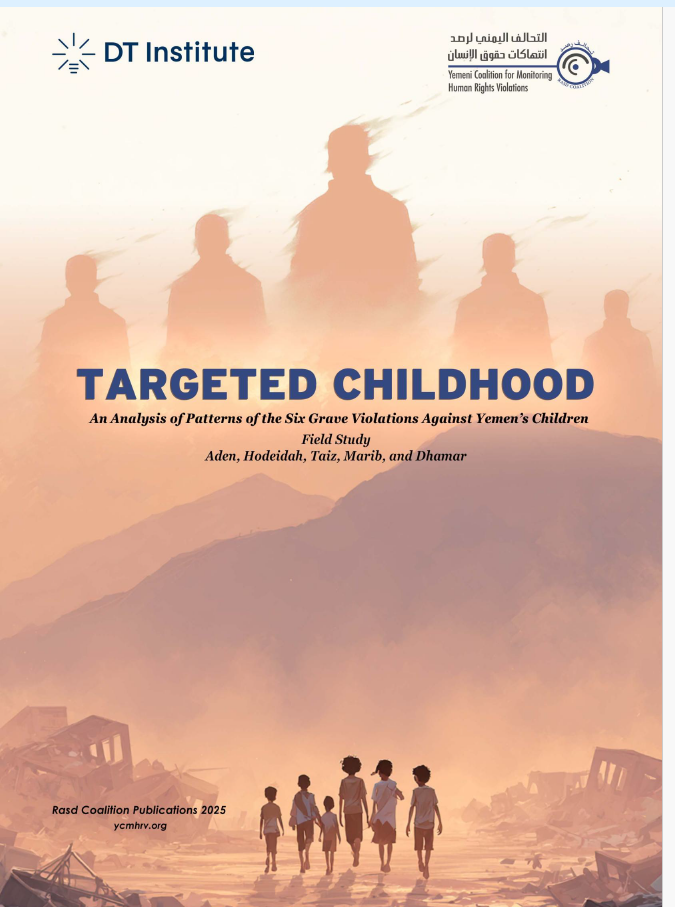“A dream come true… an independent platform aimed at paving the way toward peace grounded in justice.”
With these words, Amat Al-Salam Al-Hajj, Chairperson of SPARK partner, Abductees’ Mothers Association (AMA) and recipient of the International Women of Courage Award, described the establishment of the Transitional Justice Ambassadors Forum (TJAF) — a critical, survivor-led initiative dedicated to placing victims at the heart of Yemen’s fragile path to peace.
The TJAF was established by the AMA with support from SAM for Rights and Liberties under the Supporting Peace in Yemen through Accountability, Reconciliation, and Knowledge-Sharing (SPARK) project, conducted in cooperation and partnership with DT Institute. Crucially, it was not created in isolation but strategically built on prior SPARK activities, channeling the capacity of survivors who had already undergone intensive transitional justice training. This ensures sustainable impact by transforming individual knowledge into collective, institutional action.
The Forum aims to create a movement determined to ensure accountability and justice. “The victims of Yemen are not just numbers in reports or cases in archives. Transitional justice cannot be effective unless it begins with listening to victims, understanding their needs, and putting their rights at the forefront,” remarked Elobaid A. Elobaid, a UN Senior Advisor, during the launch. The TJAF brings the space and resources, led by survivors and advocates, to transform individual suffering into collective, proactive action.
Strategic Three-Fold Vision
The TJAF’s vision is a focused and interconnected strategy for long-term impact:
- To establish a sustainable platform where survivors’ voices are continuously amplified and streamlined through key justice measures.
- To bridge local testimonies with international advocacy, ensuring Yemen’s lived experiences inform global transitional justice efforts.
- To foster reconciliation through justice—an essential building block for any peace process now or in the future.
The Dual Mandate: Ambassadors and Guardians of Justice
At the heart of TJAF’s strategy is the recognition that the most authentic truth is told by those who lived it — the survivors. The Forum provides a powerful dual role: survivors are not only ambassadors of justice — carrying victims’ voices into national and international spaces — but also guardians of justice, protecting truth, preserving memory, and ensuring that the suffering of victims is neither erased nor politicized, and most importantly, never happens again.
As Survivor Mahir Hibah explains: “We look forward to being trained and empowered on transitional justice so that our cases remain at the center of the process. We want to access truth, reparations, accountability, and recognition — not only for ourselves but to shape a fairer future for Yemen.”
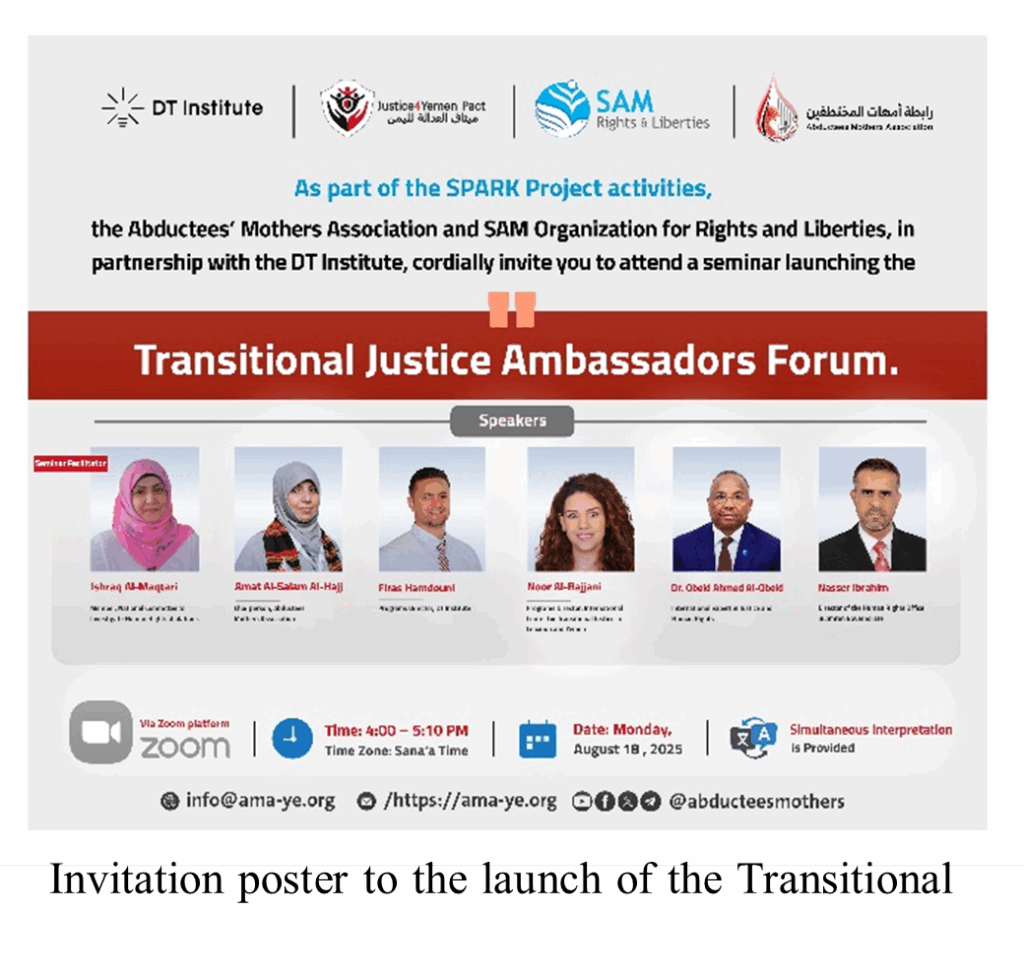
Promising Momentum
Right after its launch in August, and despite immense security challenges, the Forum quickly moved from planning to tangible, action-oriented steps, demonstrating its commitment to being victim-led:
- A Unified National Mandate: Launch of the Transitional Justice Ambassadors Forum: The Forum was officially introduced through the Justice for Peace webinar on August 18, engaging over 125 participants from civil society, survivors, and international experts. Participants included the Human Rights Office in Amran and the International Center for Transitional Justice (ICTJ), among other key stakeholders. The launch was a significant event that formally established a crucial, victim-centered, and nationwide structure for justice advocacy in Yemen.
A key outcome was the collective affirmation that victims must be leaders whose rights — including the demand for comprehensive financial and moral reparations — must direct the process. This participation must happen on two distinct levels: sharing their experiences as victims and helping design/implement TJ processes.
Participants emphasized that Trasnitional Justice is not an end goal, but a “long-term system of change” to restore public confidence and prevent human rights violations. Nour El Bejjani of ICTJ Yemen stressed that transitional justice must be pursued during the conflict as a parallel mechanism for peace. Participants believed that the Forum serves as this crucial, unified safe space to empower women and youth, build alliances, and leverage the SPARK training materials as sustainable capacity-building tools.
This atmosphere of unified hope was summarized by one participant: “I believe the Forum will leave a strong mark on the future of transitional justice and victims in Yemen, and will make a unique contribution in supporting victims and conveying their voices.”
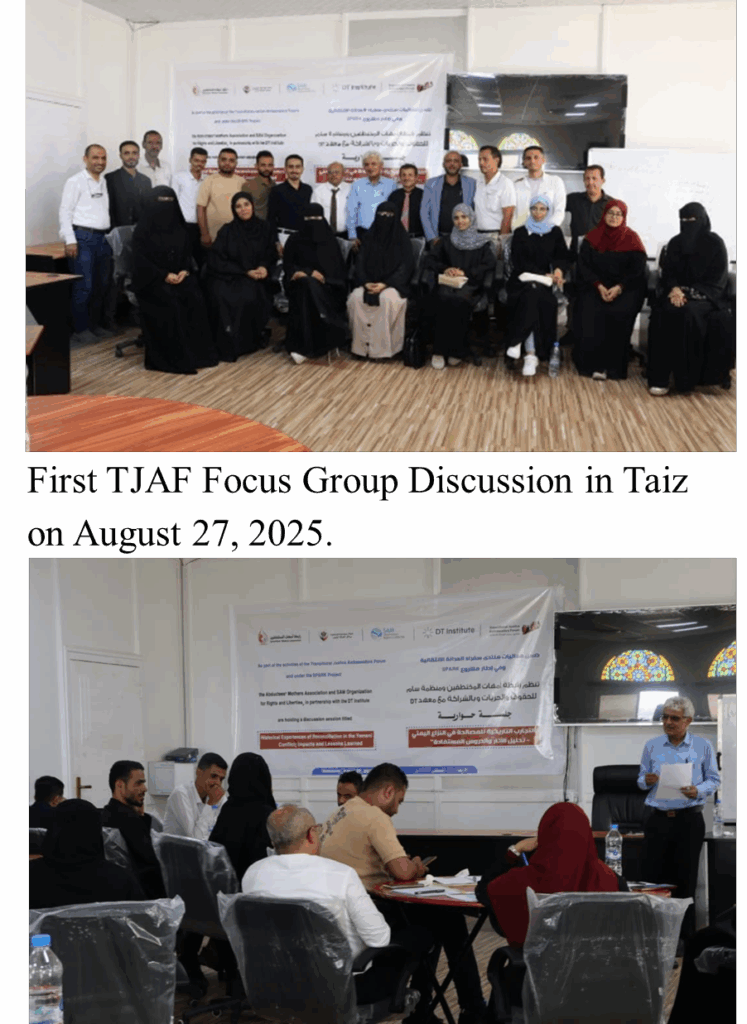
- Victim-Centric Leadership: A Founding Committee was immediately formed, including survivors, women leaders, and judges, embedding victims’ priorities alongside civil society vision from the outset. This includes intensive meetings and designation of the Forum’s structure and priorities.
- Policy Influence and Knowledge Mobilization:The Forum’s activities include a powerful policy and advocacy framework in order to challenge Yemen’s current path and secure genuine justice. This initiative has already kicked off with a strategic Focus Group Discussion (FGD) in Taiz, bringing together 20 critical actors, including 10 men and 10 women from political experts and academic from political, law schools. into direct dialogue to forge essential communication channels.
A similar FGD is scheduled to take place in Marib as well. The central drive of these initiatives is to establish a truly impartial justice system – one that actively fights politicization and the dangerous notion of “victor’s justice” and is defined by the demand to revoke the Immunity Law that currently shields high-ranking perpetrators.
Furthemore, the Forum will develop a vital working paper that historically contextualizes the conflict, ensuring all future justice phases are informed by clear lessons and concrete recommendations shared directly with the Special Envoy’s Office or relative agencies. These early steps have sparked strong interest, demonstrating the Forum’s strategic momentum.
The Path Ahead: Generating Three-Level Impact
The Forum will continue to expand its influence and in the coming months. The Forum has recently opened membership applications, will hold regular monthly meetings featuring survivor testimonies, and conduct awareness sessions across Marib and Taiz. The ambassadors are expected to organize awareness and advocacy activities in their respective governorates, raise awareness about the violations occurring there, and communicate with victims of these violations in order to train and engage them in the Forum’s activities.
As part of its long-term objectives and to ensure a nationwide application of justice, the Transitional Justice Ambassadors Forum is preparing procedural manuals on the implementation of transitional justice mechanisms. These guides for truth commissions, institutional reform, criminal accountability, and reparations will support future fact-finding efforts and strengthen criminal accountability, particularly in cases of collective violations where a single perpetrator has committed abuses against multiple citizens.
Moreover, the Forum is expanding engagement with local civil society, including SPARK partner, SAM Organization for Human Rights, who will be actively involved for the next period to maximize the Forum’s impact.
This crucial groundwork will culminate in the public release of a research paper on reconciliation in Yemen, followed by a nationwide media campaign, #Justice4Yemen.
This comprehensive approach is designed to generate a synchronized impact across three distinct levels:
- For Survivors: They gain greater knowledge, empowerment, and achieve active participation in shaping both peace and justice processes.
- For Yemeni Society: The partnership with human rights activists and representatives from civil society will expand impact, working to enhance awareness of transitional justice and foster renewed trust built through dialogue. Survivors and members will act as catalysts, ultimately driving more inclusive reconciliation processes across communities.
- For the Global Transitional Justice Movement: The TJAF provides a vital, victim-led Forum model working from a civil society grounding, contributing locally grounded evidence and survivor testimonies that inform and enrich international debates.
Looking further ahead, the Forum aspires to deepen its role in Yemen’s transitional justice journey. Future priorities include:
- Developing a unified methodology for documenting violations: A strategic step toward transitional justice, this will support future truth commissions and strengthen accountability by producing evidence-based case files, especially for collective violations.
- Establishing mechanisms for psychological and legal support: Ensuring victims not only have their voices heard but also receive the protection and care necessary to participate meaningfully in transitional justice processes.
- Training a larger cohort of survivors: Expanding survivor capacity on TJ principles so they can lead awareness, advocacy, and community-level reconciliation across the country.
- Producing practical procedural guides: Creating reference manuals for truth commissions, institutional reform, criminal accountability, and reparations to provide Yemen with tools for implementing TJ mechanisms effectively.
TJAF represents a vital opportunity — both through its current projects and future scaling priorities — to go beyond addressing immediate needs and to lay the foundations for a sustainable, nationally owned transitional justice movement capable of guiding Yemen toward justice and peace.
A Genuine Alliance for Proactive Justice
What makes the Forum special is its combination of survivor leadership, knowledge sharing, and advocacy, reinforced by an essential alliance with justice stakeholders in civil society.
As Sahar Mohammed, DT Institute Program Assistant, highlights: “The founder is the Abductees’ Mothers Association, itself a victim-led organization… Indeed, this is institutional work for justice in Yemen.”
The Abductees’ Mothers Association (AMA), in itself is a pioneering women-led organization, and it has always prioritized victims and consistently called for their reparation. Through its tireless advocacy, AMA has secured the release of thousands of detainees and earned national trust. Its Chairperson, Amat Al-Salam Al-Hajj, received the International Women of Courage Award in recognition of this work — recognition that now strengthens the Forum’s legitimacy as it grows into a national movement for justice.
This genuine alliance between victims and civil society is driven by a singular, shared goal: achieving justice, redressing victims, and preventing recurrence. Feras Hamdouni, Senior Program Manager at DT Institute, observed: “In transitional justice, most actors have conflicting interests — except victims and civil society.”
As Najla Fadhil, AMA Coordinator, concludes, the most important thing is “to empower victims, not just to tell their stories, but to influence the future. This is how we move from passive memory to proactive justice.”

